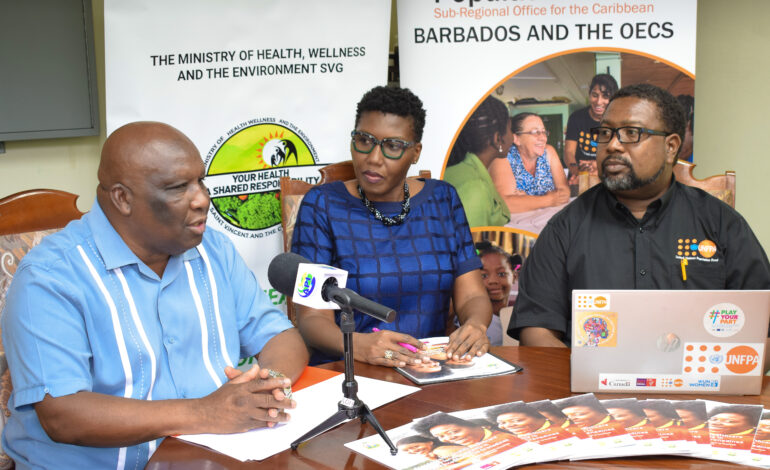
KINGSTOWN, ST. VINCENT AND THE GRENADINES; TUESDAY DECEMBER 17, 2024 – St. Vincent and the Grenadines’ Ministry of Health on Wednesday December 11, 2024, received the draft Standards for Quality Healthcare Services for Adolescents in St. Vincent and the Grenadines, so young Vincentians can look forward to improved quality health services.
This initiative continues to evolve with ongoing efforts to adapt to the emerging health challenges and integrated youth voices into policy and programme development. UNFPA through the Build Back Equal project, supported by Global Affairs Canada and partner UN Women, shares the commitment to investing in the health and future of the region’s youth, especially youth in St. Vincent and the Grenadines.
Speaking at the handover ceremony, Minister for Health, St. Clair Prince stated: “We in St.
Vincent and the Grenadines have embarked on a means of transforming our health care system here in St. Vincent and the Grenadines, and I am sure that these draft guidelines or standards for the improvement of health services as far as adolescents are concerned, will add a very important fillip to this particular initiative.”
According to UNFPA Youth and Gender Specialist Philcol Jeffers in explaining the context to
the drafting of the Standards, “Adolescent health in the Caribbean, and here in St. Vincent
and the Grenadines faces unique health challenges influenced by social, cultural and economic factors. Issues such as high rates of teen pregnancy, early exposure to sex, sexually transmitted infections, mental health concerns, and exposures to violence, have underscored the need for a comprehensive, coordinated approach to adolescent health.
“Recognizing these challenges, governments, regional organizations, and health stakeholders in the Caribbean began efforts to standardize adolescent health services. These efforts were guided by the global framework like the World Health Organization (WHO), Adolescent Health Guidelines, and tailored to reflect the region’s specific needs.”
It must be noted that the development of the standards for quality healthcare services for the adolescents in St. Vincent and the Grenadines, a component of the Build Back Equal project, was driven by equitable, youth-friendly services that address physical, mental, and social well-being. The key stakeholders included the Pan American Health Organization (PAHO), a number of UN agencies, the St. Vincent and the Grenadines Ministry of Health along with the various local agencies, and civic society, along with a number of adolescents who collaborated on the initiative.
All this took place through a number of UNFPA-held consultations, workshops and research, which contributed to the shaping of the standards which ensured that they were evidence-based, culturally relevant, and are aligned with human rights principles and global best practices.
The resulting standards aim to provide a framework for improving the delivery of adolescent-friendly health services across St. Vincent and the Grenadines, emphasizing the importance of confidentiality, accessibility, non-judgmental care, and addressing the holistic needs of young people, including physical, emotional, and social well-being. These standards also align with the international global goals, such as the Sustainable Development Goals, particularly related to health, education, and gender equality.
Ms. De-Jane Gibbons, the UNFPA Liaison Officer for Barbados and the OECS, sees the handover of the Standards for Quality Healthcare Services for Adolescents in St Vincent and the Grenadines as marking “a significant step towards prioritising the health and the well-being of adolescents and young people in this country.
“Our commitment is to continue to work with adolescents and young people to ensure that
youth responsive, sexual and reproductive health services and information are an integral
part of our joint efforts.”
The UNFPA Standards for Quality Healthcare Services for Adolescents, once approved at Cabinet level, are expected to serve as a crucial tool in fostering the well-being of Vincentian youth, ensuring they receive the support they need to lead healthy, empowered lives, improving access to quality health care, fostering safe environments, and empowering young people.








